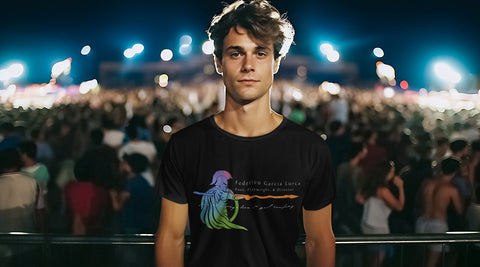
García Lorca (1898-1936)
Federico García Lorca, one of Spain's most celebrated literary figures, was a renowned poet, playwright, and theater director born in 1898. While the topic of his sexuality is a subject of historical debate, there is evidence to suggest that García Lorca was indeed gay. During his time, discussing one's sexual orientation openly was challenging due to societal norms, and García Lorca lived in a period marked by conservative attitudes in Spain.


García Lorca's works, such as "Romancero Gitano" and "La Casa de Bernarda Alba," are known for their rich symbolism, passionate themes, and exploration of human emotions. Some scholars and critics believe that his poems contain subtle references to his own experiences and desires, offering glimpses into the challenges faced by LGBTQ individuals during his lifetime.

Recommended Reading, Skip Amazon & Support Queer Owned Bookstores | The Collected Poems: A Bilingual Edition (Revised) (ISBN-10: 0374526915 ISBN-13: 978-0374526917)

Tragically, García Lorca's life was cut short when he was executed by Nationalist forces during the Spanish Civil War in 1936. The circumstances of his death have led to speculation about the motives behind it, with some suggesting that his perceived sexual orientation played a role. His tragic end has added layers of complexity to his legacy, underscoring the difficulties faced by LGBTQ individuals during periods of political and social upheaval.
“To burn with desire and keep quiet about it is the greatest punishment we can bring on ourselves.” ― Federico García Lorca, Blood Wedding and Yerma
As societal attitudes evolved over the years, there has been a greater appreciation for García Lorca's contributions to literature, and discussions about his sexual orientation have become more open. Today, his work is celebrated for its artistic brilliance and its potential to shed light on the personal struggles and societal challenges faced by individuals navigating their identities in less accepting times.
As societal attitudes evolved over the years, there has been a greater appreciation for García Lorca's contributions to literature, and discussions about his sexual orientation have become more open. Today, his work is celebrated for its artistic brilliance and its potential to shed light on the personal struggles and societal challenges faced by individuals navigating their identities in less accepting times.


In conclusion, while definitive evidence regarding Federico García Lorca's sexuality remains elusive due to the historical context, there are indications that he may have been gay.
Movie: Little Ashes Trailer


His legacy, marked by profound artistic contributions and a tragic end, continues to captivate audiences, prompting reflections on the intersection of personal identity, societal norms, and artistic expression.

Our Spartan Pride T-Shirts & Jersey Tanks
We're soldiers, scientists, politicians, business owners, artists & entertainers. We're fighters with a rich history of significant contributions to all our cultures. Our pride shirts display this, each with a name and the contributions of the individual. There is no shame in being LGBTQIA+ just an enormous celebration that you are authentic and fearless. "You've always been in good company." Walt & Pete

